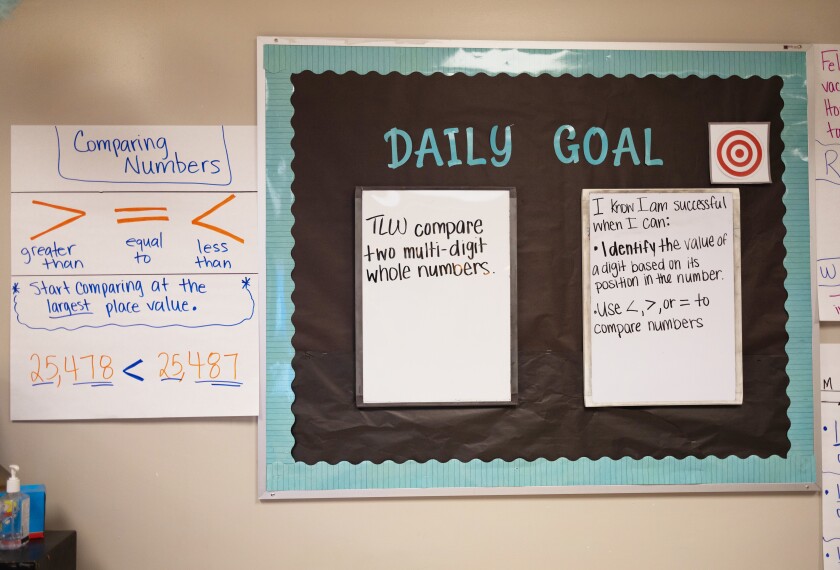Long considered a crucial portal to the world of postsecondary education and a launching point for more complex studies of mathematics, Algebra 1 is at the heart of most students’ academic schedules in the late middle grades or early in high school.
Despite its increasing importance in schools, though, many observers say there is little uniformity in how that course on the relations and properties of quantities is taught, or what students are expected to learn while taking it.
Troubled by that lack of knowledge, officials at the National Center for Education Statistics are expected soon to launch a first-of-its-kind study of introductory algebra, aimed at exploring the content and teaching of the course.
|
Robert Lerner, the commissioner of the NCES, recently described the study as a pilot project with “fairly ambitious” goals.
“We have the title ‘Algebra 1,’ but a perusal of textbooks suggests different things are being taught,” said Mr. Lerner, whose center is the federal government’s primary source of educational data.
Math test scores have shown that students who are taking algebra courses with the same titles sometimes perform much differently on standardized tests, the commissioner noted. “Doesn’t that raise questions about what they’re being exposed to?” he said.
Mr. Lerner said he chose Algebra 1 for study in part because it has traditionally been a “gateway to college” course—an academic prerequisite for students seeking to pursue a postsecondary degree.
The commissioner described the basic outlines of the study in an Aug. 6 appearance here before the National Assessment Governing Board. The project will include a study of both student achievement and teacher characteristics in middle and high school, he said, and it is likely to be conducted this fall and next spring.
The NCES probably will examine not only algebra-course titles and descriptions, but also collect data on textbooks and syllabi, along with midterm and final exams, Mr. Lerner told the board, which sets policy for the National Assessment of Educational Progress. NAEP is the primary nationwide gauge of student academic performance. (“Board Adopts New Guidelines for Participation in NAEP,” this issue.)
NCES officials will consult with curriculum experts in mathematics and science in the coming months about how to conduct the research, Mr. Lerner said following his presentation.
‘All Over the Place’
Mr. Lerner said he was particularly intrigued by the results of a study of high school transcripts between 1990 and 2000 that the governing board released this year.
Although that study showed an increase in the percentage of students taking rigorous math courses, it also found broad discrepancies in NAEP test scores for students from different racial and ethnic backgrounds who had taken courses with the same titles, in Algebra 1 and other subjects.
Introductory algebra has traditionally been taught at the 9th grade level, though a movement to teach it as early as 8th or even 7th grade is afoot, said James M. Rubillo, the executive director of the National Council of Teachers of Mathematics. The organization favors the integration of algebraic concepts as early as elementary school, so that students are prepared for more rigorous math later on.
The lack of consistency in the teaching of the algebra course is widespread, he said. Such factors as students’ moves between school districts and states where the subject matter varies greatly worsen the problem, said Mr. Rubillo, whose Reston, Va.-based group represents 100,000 mathematics teachers.
“It’s all over the place,” he said. “This is a nation of local control.”
Matthew Gandal, the executive vice president of Achieve, a Washington-based organization that advocates higher academic standards in schools, applauded the NCES initiative.
His organization recently helped conduct the American Diploma Project, which explored the disconnect between high school courses and tests and the skills that students need to succeed in college and the workplace. (“States Must Beef Up Diploma Demands, Study Maintains,” Feb. 11, 2004.)
Mr. Gandal, who presented information on the transition from K-12 to college at the NAEP governing board’s August meeting, says states and schools need to do a better job of aligning courses from one grade to the next, researching them down to the earliest grades.
“A course title alone,” he said, “doesn’t tell you how rich or challenging that course is.”




